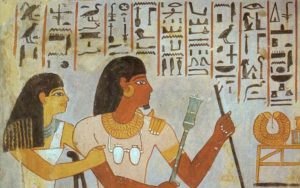Egyptian society was structured like a pyramid. At the top where the gods, such as RA, Osiris, and Isis. Egyptians believed that the gods controlled the universe. Therefore, it was important to keep them happy. They could make the Nile overflow, cause famine, or even bring death.
In the Old Kingdom, royal power was absolute. The Pharaoh (the term originally meant “great house” or “palace”), governed his kingdom through his family and appointed officials. A government was merely one aspect of religion and religion dominated Egyptian life.

The pharaoh, the Egyptian king, was at the top of Egyptian society. He was the embodiment of power and authority and the son of the god Ra. The vizier was the second most powerful official. He was the pharaoh’s most trusted advisor. He ran all aspects of Ancient Egypt laws and government on the ruler’s behalf.
The noble class of Ancient Egypt typically worked for the pharoahs or the royal family in some way. The nobles-people who served the Pharaohs as viziers, courtiers, officials, and even artisans-soon followed suit and began to have their tombs constructed in the Valley of the Nobles which is just east of the Valley of the Kings.
His position was very powerful and, like that of the king, it passed from father to son. The Vizier was also the judge of the high court. If you had a problem and it was not solved in the local courts, or in the provincial courts, you could bring your problem in front of the Vizier on a first come, first served basis.
Daily life in ancient Egypt revolved around the Nile and the fertile land along its banks. In Egypt, ancient houses constructed by the wealthy nobles were much different than those built by commoners. Those who could afford to do so built their ancient Egypt house of stone taken from stone quarries.
Ancient Egypt houses constructed of stone were much sturdier and solidly built. The wealthy could afford to fill their homes with far more luxuries than poorer families. In Egypt ancient houses built by wealthy families, were likely to contain tiled floors and beautifully painted walls.
The rich man in his house slept on a wood-frame bed made of interlaced cords. with folded sheets for a mattress and with a wooden headrest. Under his bed was a chamber pot. The wealthy Egyptian loved to give a good “beer house”, as he called a dinner party. In early times, men squatted at mealtime on rugs and cushions.